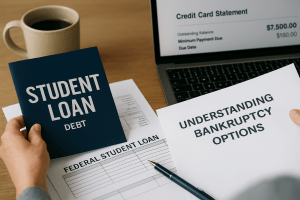
Can I File Bankruptcy on Student Loans? Here’s the Truth
Can I File Bankruptcy on Student Loans in the U.S.? Can I file bankruptcy on student loans? It’s a question
Error: Contact form not found.
Lorem ipsum dolor sit amet, consectetur adipiscing elit. Ut elit tellus, luctus nec ullamcorper mattis, pulvinar dapibus leo.
Can I file bankruptcy on student loans? It’s a question many borrowers ask when they find themselves overwhelmed with debt and few options left. While student loans are notoriously hard to discharge, it is possible in certain circumstances, and the process is evolving.
Bankruptcy may not wipe out student debt easily, but recent legal changes have made it more accessible than before. This article explains the process, the legal standards, and what you need to know if you’re considering bankruptcy as a way to eliminate student loans.
Student loans are treated differently than most unsecured debts. While credit cards, personal loans, and medical bills can typically be discharged in Chapter 7 bankruptcy, student loan debt requires a higher legal standard.
To eliminate student loan debt through bankruptcy, you must prove that repaying the loan would cause “undue hardship.” This standard has been interpreted differently across jurisdictions, but it’s historically been tough to meet.
In most cases, courts use the Brunner test to determine undue hardship. You’ll need to show:
If you pass this test, you may be able to discharge your student loans, either fully or partially.
In 2022, the U.S. Department of Justice and the Department of Education introduced new guidelines to streamline the process of discharging federal student loans in bankruptcy.
These updates aim to reduce unnecessary legal burdens and help bankruptcy filers present their cases more effectively. As part of the new process:
This doesn’t guarantee success, but it means borrowers who once felt hopeless now have a clearer path forward.
You must first file a Chapter 7 or Chapter 13 bankruptcy case. Student loan discharge is not automatic — it requires an extra legal step.
You must initiate a separate lawsuit within the bankruptcy case called an adversary proceeding. This is where you ask the court to review your student loans and determine if they qualify for discharge.
Use documents like income statements, monthly expenses, employment records, and past repayment attempts to demonstrate undue hardship. This is where legal support is especially useful.
Discharging student loans through bankruptcy remains challenging, but it’s more achievable than it used to be. With evolving legal standards and clearer guidelines for demonstrating undue hardship, some borrowers are navigating this process under specific circumstances. If you’re asking, can I file bankruptcy on student loans? The answer is yes, when specific conditions are met. Exploring your eligibility with an experienced professional may be a helpful next step.
Still wondering, can I file bankruptcy on student loans? You don’t have to go through it alone. Legal support can help you understand your options, prepare your case, and navigate the adversary proceeding process.
Get a free evaluation from Bankruptcy Attorneys to discuss whether your student loan debt may qualify for discharge under current laws and guidance.
Yes, but you must pass the undue hardship test through an adversary proceeding.
Federal loans may now be easier to discharge due to updated DOJ guidance, but private loans can also be challenged.
It’s a separate lawsuit within the bankruptcy case used to request student loan discharge.
It varies, but expect several months for the entire bankruptcy and adversary proceeding.
Yes, it will appear on your credit report, but many find the long-term relief outweighs the short-term impact.
Attorney Advertising. This site is a legal marketing service and does not provide legal advice. Submitting information does not create an attorney-client relationship. Results are not guaranteed.

Can I File Bankruptcy on Student Loans in the U.S.? Can I file bankruptcy on student loans? It’s a question
| Cookie | Duration | Description |
|---|---|---|
| cookielawinfo-checkbox-analytics | 11 months | This cookie is set by GDPR Cookie Consent plugin. The cookie is used to store the user consent for the cookies in the category "Analytics". |
| cookielawinfo-checkbox-functional | 11 months | The cookie is set by GDPR cookie consent to record the user consent for the cookies in the category "Functional". |
| cookielawinfo-checkbox-necessary | 11 months | This cookie is set by GDPR Cookie Consent plugin. The cookies is used to store the user consent for the cookies in the category "Necessary". |
| cookielawinfo-checkbox-others | 11 months | This cookie is set by GDPR Cookie Consent plugin. The cookie is used to store the user consent for the cookies in the category "Other. |
| cookielawinfo-checkbox-performance | 11 months | This cookie is set by GDPR Cookie Consent plugin. The cookie is used to store the user consent for the cookies in the category "Performance". |
| viewed_cookie_policy | 11 months | The cookie is set by the GDPR Cookie Consent plugin and is used to store whether or not user has consented to the use of cookies. It does not store any personal data. |